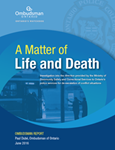The Ombudsman's Top 10 Stories of 2017
December 29, 2017
29 December 2017
Ombudsman Paul Dubé’s second year in office was distinguished by our first-ever investigations in the broader public sector (related to municipalities and school boards), important reforms in correctional services and policing, and connecting with a wider range of stakeholders than ever before. Here’s our annual top 10 list of key developments in the past year.
Ombudsman Paul Dubé’s second year in office was distinguished by our first-ever investigations in the broader public sector (related to municipalities and school boards), important reforms in correctional services and policing, and connecting with a wider range of stakeholders than ever before. Here’s our annual top 10 list of key developments in the past year.
 1. REFORMING SOLITARY CONFINEMENT
1. REFORMING SOLITARY CONFINEMENT
The province committed to implementing all 32 of the Ombudsman’s recommendations in his April 2017 report Out of Oversight, Out of Mind, which exposed serious failures in how it tracks inmates who are placed in segregation, or solitary confinement. Read the investigation update in our 2016-2017 Annual Report.
 2. IMPROVING POLICE OVERSIGHT
2. IMPROVING POLICE OVERSIGHT
The province’s new policing legislation – Bill 175, the Safer Ontario Act – supports numerous longstanding Ombudsman recommendations for strengthening civilian oversight of police, including extending our office’s mandate to all three police oversight bodies, and strengthening the Special Investigations Unit. In welcoming the bill’s improvements, Ombudsman Dubé said he is hopeful that the government will also follow through on its commitment to This link opens in a new tab mandatory de-escalation training for police, as he recommended in his 2016 report, A Matter of Life and Death.
 3. MAKING A DIFFERENCE FOR MUNICIPALITIES
3. MAKING A DIFFERENCE FOR MUNICIPALITIES
We’ve received more than 5,500 complaints about municipalities since they were brought under our jurisdiction on New Year’s Day 2016. Almost all have been resolved, but this year, we also reported on our first-ever investigations of municipal issues – in Brampton, Red Rock and Elliot Lake.
The Brampton case was notable in that it found no wrongdoing, but proposed best practices applicable to all municipalities for procurement policies. Our latest investigation – into a Niagara regional council meeting earlier this month where property was seized from a journalist and citizen-blogger – is now under way. Read more about our municipal oversight.
 4. LETTING THE SUNSHINE IN
4. LETTING THE SUNSHINE IN
Speaking of municipalities, we’re about to mark the 10-year anniversary of Ontario’s “Sunshine Law” – the Municipal Act changes that established a complaints system to ensure council meetings are open to the public unless they fit specific, narrow exceptions.
As the closed meeting investigator for more than 200 municipalities (the remaining ones have appointed their own investigators), our office has issued hundreds of recommendations over the years, helping municipalities ensure their meeting practices are within the law. With new amendments kicking in this New Year’s Day, adding more exceptions and a new definition of “meeting,” we’re adding more public resources to our website and will add an improved online digest of our closed meeting investigation reports later in 2018.
 5. LEARNING FROM CRISIS
5. LEARNING FROM CRISIS
The Ombudsman’s first systemic investigation related to school boards, launched in the wake of the September 2016 school bus driver shortage in Toronto that left thousands of young children stranded, wrapped up in time for the city’s public and Catholic boards to implement lessons learned this fall. The boards and their transportation consortium accepted all 42 of Ombudsman Dubé’s recommendations in his report, The Route of the Problem.
The Ombudsman encouraged all boards to take note of the recommendations to improve their transportation and communication policies and procedures.
 6. INVESTIGATING DRIVER LICENCE SUSPENSIONS
6. INVESTIGATING DRIVER LICENCE SUSPENSIONS
In May, the Ombudsman announced a systemic investigation into how the Ministry of Transportation communicates with drivers whose licences have been suspended or cancelled due to unpaid fines, in the wake of complaints from drivers who had no idea they were on the road without valid driving permits. The investigation is complete and the Ombudsman’s findings and recommendations are in the process of being drafted.
 7. RELAUNCHING OUR ONLINE HOME
7. RELAUNCHING OUR ONLINE HOME
Our new and more accessible website relaunched in November with a refreshed design that also adapts easily to all screen sizes – desktop, tablet and mobile. There’s also a section dedicated to video resources.
 8. TRAINING THE WORLD
8. TRAINING THE WORLD
In October, the Ombudsman welcomed more than 70 investigators and ombudsmen from across Canada and around the world to the 10th edition of our annual training course, Sharpening Your Teeth: Advanced Investigative Training for Administrative Watchdogs. This year’s participants included the ombudsmen of Bermuda and Botswana, and staff from investigative agencies in the U.K., New Brunswick and Nova Scotia.
Kevin Page, who served as Canada’s first Parliamentary Budget Officer from 2008 to 2013, gave the This link opens in a new tab keynote address. “I’m humbled you do this work,” Page told participants, “We need you folks.” Since 2007, our office has trained hundreds of watchdogs around the world in conducting systemic investigations, always on a cost-recovery basis.
 9. GETTING TO KNOW YOU
9. GETTING TO KNOW YOU
Ombudsman Dubé and staff met with stakeholders and the public at more than 100 outreach events across Ontario this year, including speeches and presentations, community fairs, conferences of municipal, university, school board and provincial stakeholders, as well as gatherings of other ombudsmen and oversight professionals.
Look for our staff in the new year at the This link opens in a new tab Rural Ontario Municipal Association conference in Toronto on January 21 and 22, and at the This link opens in a new tab Drainage Superintendents Association of Ontario annual convention in London on January 25.
 10. MAKING RESOLUTIONS STICK
10. MAKING RESOLUTIONS STICK
The Ombudsman’s resolutions aren’t the kind you make on New Year’s Day. Our staff handle more than 20,000 complaints per year, by resolving more than two-thirds of them quickly and informally, in two weeks or less, without need for formal investigation. In 2017, for example, we helped a man get his health care coverage back after he lost all his identification; we aided an ODSP recipient in recovering her benefits when they were suspended after a miscommunication with her case manager; and we assisted a college student whose parents were both significantly ill access $1,880 in provincial grants. Read more examples of our quick complaint resolutions.